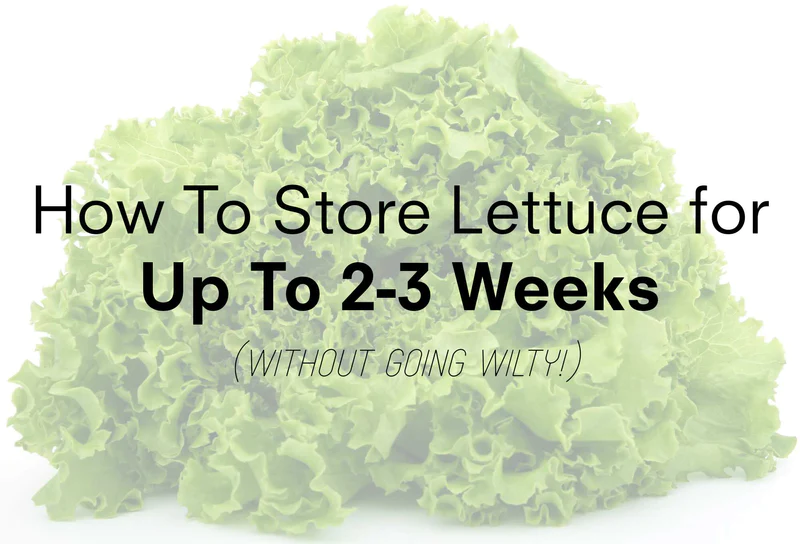Table of Contents
No one likes to waste food, but everyone does it. In fact, according to the US Department of Agriculture, over one-third of available food is wasted in America.
Not only is food waste bad for the economy and your wallet, but it’s bad for the planet too. It’s also just downright frustrating. You tell yourself you’ll buy less next time, or prioritize eating at home to avoid waste, but then life gets in the way and those tactics never work.
So what actually works to reduce how much fresh food you waste at home? Storing your food properly.
Taking just a few extra minutes to store your food properly while you unload your groceries can prolong the life of your food for weeks. We’re going to breakdown why food waste is so bad, tips to avoid it, and how to store fresh food so that it never gets wasted again.
Why Food Waste Is the Worst
First, lets breakdown food waste a little more. Unfortunately, the US leads in countries that waste the most food. In fact, between 30-40% of the US food supply is wasted. That equals 80 billion pounds of food that are thrown away, which is the equivalent of 1,000 Empire State Buildings.
It also equals $161 billion in profit loss, which translates to $1600 per family every year. Wouldn’t it be nice to take a trip with that money instead of wasting it on food that gets thrown out?
When farm-fresh foods are thrown out, it doesn’t just waste your money. It also wastes the farmer’s money, labor, and resources. It’s also hard on the planet. Thrown-out food goes to landfills, where it emits methane. Methane is a powerful greenhouse gas that contributes to climate change.
We couldn’t spell it out any clearer: food waste is bad. But it’s not all doom and gloom. There are some easy solutions you can try so that you and your family can become food waste warriors.
Let’s breakdown the top solution to food waste: storing your food properly so it doesn’t go bad as quickly.
How to Store Fresh Food So It Lasts Longer
The good news: you can combat food waste right from your own kitchen. It all starts with how you store your fresh food. Never deal with wilting lettuce or soft carrots again.
Let’s breakdown why food goes bad so quickly and how to keep lettuce fresh and other produce so you can enjoy it longer.
The reason food goes bad in the fridge or on your counter is because of too much exposure to air. Specifically, when fruits and veggies are stored in the plastic produce bags you get at the grocery stores, they go bad quicker.
Taking your own reusable produce bags is the way to go if you want to avoid plastic, but if you do need to use a plastic produce bag at the store, you should take your food out of it as soon as you get home. The trapped air in the plastic bag produces ethylene gas, which suffocates the produce. This causes it to ripen more quickly and go bad prematurely.
Instead of air, your produce needs moisture to last longer. The best way to give your food moisture is to store it in a Freshie Food Saver Bag.
The Freshie Food Saver Bag
The Freshie Food Saver Bag will save you money and conquer food waste at the same time. It works by trapping moisture in with your food, which keeps it hydrated and prolongs its life.
The Freshie works will all types of produce, but it’s especially miraculous with leafy greens like lettuce and spinach. It even works with herbs like cilantro and parsley.
The reusable bag is made with soft organic cotton and prolongs the life of your food up to three times. Each bag is 12″ by 15″ inches, so you can store several types of produce together in one bag. It can also be reused over and over again, so you save even more money over time.
How does it work? Save your food in just a few easy steps:
Step 1: Simply wet the bag and ring out the excess water
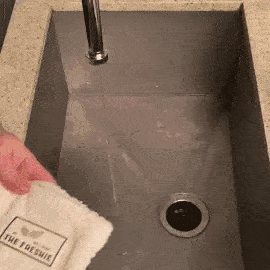
Step 2: Wash your produce
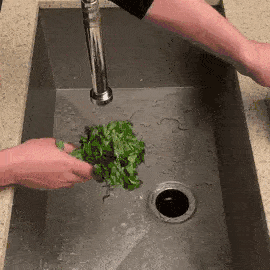
Step 3: Store your produce in the bag, zip it up, and put it in the fridge
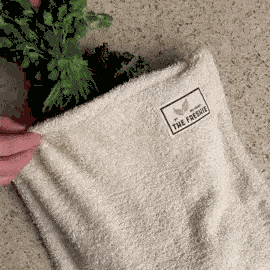
Step 4: As the bag dries out over time, spray with water to keep it moist
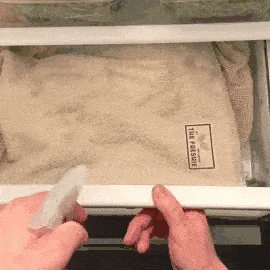
The moisture and humidity will keep your produce fresh and happy so you can enjoy it for weeks and not worry about food waste ever again.
Why Choose the Freshie Food Saver Bag
Freshie is committed to saving you money on your grocery bill. They are also committed to sustainability from start to finish. Every Freshie bag is manufactured sustainably with solar-powered clean energy and using 70% rainfall.
The terry cotton is certified by the Global Organic Textile Standard, which makes it the cleanest cotton option out there. It’s BPA-free, chemical-free, and does not contain toxins or pesticides.
The Freshie Food Saver Bag is extremely durable and designed to last for ten years. It’s machine washable on a delicate cycle, which makes it even more convenient.
Using the Freshie will not only save you money, but it will also save you time. Since your food lasts longer, you can make fewer trips to the grocery store. Imagine how you could use your time and money now that you do not have to worry about food waste! For a limited time, get The Freshie for an additional 10% off with the code FRESH10.
Other Ways to Reduce Food Waste
Using a Freshie Food Saver Bag will cut your household’s food waste down significantly, so you are already a food waste warrior just with that simple step. But if you want to take it a step further, here are some other tips and tricks you can use to make sure you use all of your food.
Create a Meal Plan
Before you grocery shop, try creating a meal plan for the week. Leave room for adjustments and leftovers, which will help you waste less food. Once you have a plan in place, make a list of the grocery items you need to make those meals.
Having a meal plan instead of randomly shopping means everything you buy already has a destination. This will help you utilize more of your fresh food and save money by not buying too much. That leads us to the next tip.
Shop With a Purpose
Never go to the grocery store without a list. If you do, you’ll be guessing about everything you need, which will lead you to throw random things in your cart that won’t get used. Having a list and knowing exactly how many onions, heads of broccoli, and avocados you need will save you money and prevent food waste.
It may sound rigid to meal plan and make a grocery list every week, but it will actually lead to more freedom. You’ll save time wandering around the grocery store, and you’ll save tons of money on your grocery bill.
Eat Your Leftovers
Leftovers have a short shelf life and it’s easy to move on to something else and let them go to waste. If you have leftovers from the dinner you made the night before, or from a night out at a restaurant, prioritize eating them before you make something new.
Put Fresh Food Where You’ll See It
If you have fresh food that you want your family to eat first before reaching for the chips, put it somewhere everyone will see it. Move it to the front of the fridge or place it in a fruit bowl on the counter.
You can even more the other non-perishable snacks, like crackers and chips, to the back of the pantry. When fresh food is the easiest thing to grab, it will get eaten first.
Freeze Fresh Food That Is About to Go Bad
When it doubt, freeze it. Just about any fresh produce can be frozen, so it’s a great way to save food just before it is about to go bad. Frozen fruits are veggies are great to use in smoothies and soups, or you can defrost them and roast them for dinner.
If you have a lot of leftovers from a big dinner, like half of a casserole for example, and you know you won’t finish it before it goes bad, freezing it is a great solution.
You can also freeze any extra food before you go on vacation so it doesn’t rot while you are gone. You’ll thank yourself when you get home to a freezer full of food and don’t have to hit the grocery store as soon as you are back in town.
When freezing produce with peels like bananas and avocados, remember to remove the peels first since they are really hard to remove once the produce is frozen.
Juice It
Are your carrots going soft? Do you have some celery in your Freshie bag that you need to use up? If you have a juicer, an easy way to use up excess veggies is to turn them into a nutritious juice.
If you don’t have a juicer, you can still make your own juice with a blender. Simply blend the veggies with some water and then strain the juice through a fine strainer or milk bag to remove the pulp.
Can It
Canning your fruits in veggies is a great way to preserve them and make them shelf-stable. Plus, you’ll have ready-to-eat food available in emergency situations like a storm. Learn how to get started with canning at home here.
Compost Your Food Scraps
As mentioned above, food that gets thrown into a landfill is a major problem for the environment. Unfortunately, food items are the number one component taking up space in the US landfills.
You can save food from going to landfills by composting it instead. Even if you become a food waste warrior and use all of your produce, you will still have scraps like banana peels, potato ends, and carrot tops that you don’t consume.
Plus, sometimes life happens, and despite your best efforts, some food may go bad in your fridge. When that happens, composting it is a much more eco-friendly way to dispose of unused food.
Composting is the process of converting organic matter back to a nutrient-rich soil called compost. Almost all organic matter, from fruits and veggies, to eggshells and fingernails, can be composted.
There are a few ways to set up an at-home composting system, and it will depend on the type of home you have and where you live. You can build your own backyard compost, utilize a municipal compost service, or take part in a drop-off program in your area. Learn more about composting options here.
Becoming a Food Waste Warrior
Congratulations on taking the first steps to reduce your food waste! Your efforts are not in vain. Each time you prevent food from going into the trash, you are making a difference for the planet, the economy, the people who made or grew your food, and your wallet.
Put simply: your small actions make a big difference. Give yourself a pat on the back every time you use your Freshie bag, freeze your leftovers, or make a meal plan before you grocery shop.
If you want to take your efforts a step further and eliminate more food waste, don’t stop at your own groceries. When you eat out, always take home your leftovers so they don’t get thrown away. To avoid single-use plastic to-go containers, take your own reusable container to pack your food in.
Never Waste Food Again
Hopefully, you feel inspired to preserve your fresh food and make it last as long as possible in a Freshie Food Saver Bag. The Freshie bag will save you time, money, and it’s good for the planet.
Utilizing all of these tips will ensure that you never waste food again, which is a major win. Grab your Freshie bag and other sustainable essentials on our website today, and check out our blog for more eco-friendly tips and resources.
